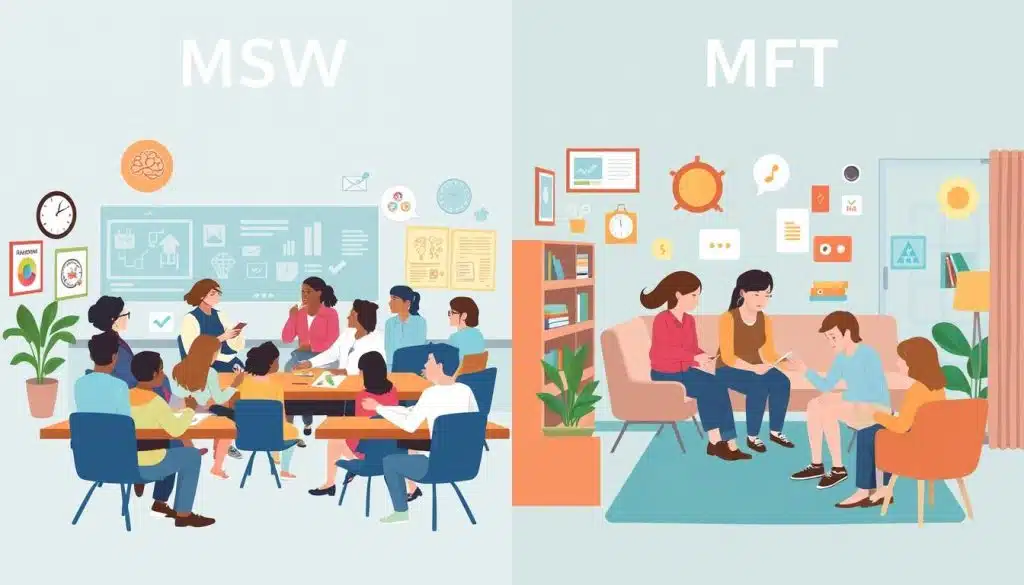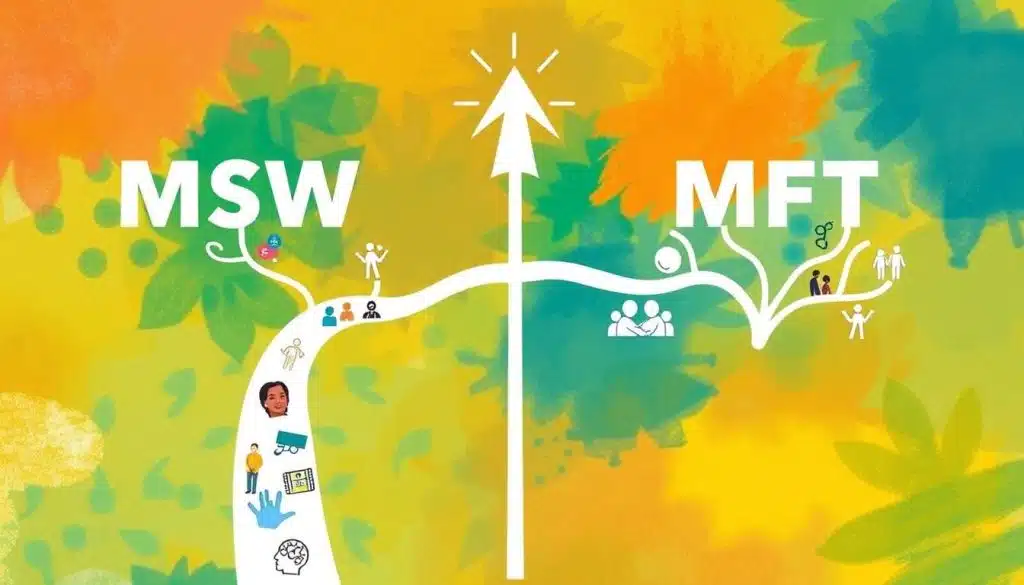You may be asking yourself what is the difference between an MSW and an MFT? Knowing the difference is key if you’re considering a career in social work. At Social Work Exam Strategies, we help you become a licensed social worker. Our support is aimed at helping you pass the ASWB exam.
An MSW degree, or Master of Social Work, prepares you for advanced social work roles. This includes becoming a licensed clinical social worker. An MFT degree, or Marriage and Family Therapy, prepares you for careers in marriage and family therapy.
Exploring social work and therapy, it’s key to grasp what MSW and MFT degrees are about. An MSW, or Master of Social Work, readies students for advanced social work roles. It covers macro, mezzo, and micro levels of practice. An MFT, or Marriage and Family Therapy, degree focuses on family and couple dynamics and psychological health.
The U.S. Bureau of Labor Statistics (BLS) reports the median annual wage for MSW holders was about $50,390 in May 2021. MFTs earned around $49,880 on average. Both degrees offer fulfilling careers, but knowing their differences is vital. MSW programs delve into social systems, while MFTs concentrate on family and couple psychology.
For those eyeing a career in social work or therapy, exploring msw jobs and mft paths is crucial. With proper education and training, one can get an mft license. This opens doors to a rewarding career in marriage and family therapy. An MSW or MFT degree is a solid base for a challenging and rewarding career, whether in individual, family, or community work.
Some key differences between MSW and MFT programs include:
When looking at an msw and mft comparison, it’s key to check the educational needs and courses. Both MSW and MFT programs need two years of full-time study. Some offer part-time options. But, the courses and field work are quite different.
MSW programs teach a wide view of social systems. You’ll learn about human behavior, social work history, and research methods. On the other hand, MFT programs dive into family dynamics and msw versus mft therapy approaches. The Commission on Accreditation for Marriage and Family Therapy Education (COAMFTE) sets standards for MFT programs. These programs need supervised clinical hours to finish.
Choosing between an msw or mft depends on your career goals and the work you want to do. An msw mft contrast can guide your choice.
Some main differences between MSW and MFT programs are:

Exploring the differences between MSW and MFT degrees, we see their practice settings and career paths. MSW graduates can work in hospitals, schools, and government agencies. On the other hand, MFT graduates usually work in private practice or outpatient mental health centers.
Looking at MSW mft career paths, MSW graduates often choose roles in clinical social work, policy, and advocacy. MFT graduates, however, focus on marriage and family therapy, counseling, and psychotherapy. The MSW mft licensure requirements also differ, with MSW graduates needing a license as a licensed clinical social worker (LCSW) and MFT graduates needing a license as a licensed marriage and family therapist (LMFT).
Here are some key differences in practice settings and career paths:
Stay updated with the latest social work licensure updates. We’re here to support you in your msw vs mft journey. With the growing demand for mental health services, employment of substance abuse, behavioral disorder, and mental health counselors is projected to grow 18 percent by 2032. Employment of marriage and family therapists is projected to grow 15 percent by 2032.

| Degree | Practice Settings | Career Paths | Licensure Requirements |
|---|---|---|---|
| MSW | Hospitals, schools, government agencies | Clinical social work, policy, advocacy | Licensed Clinical Social Worker (LCSW) |
| MFT | Private practice, outpatient mental health centers | Marriage and family therapy, counseling, psychotherapy | Licensed Marriage and Family Therapist (LMFT) |
When starting your mental health career, choosing between an MSW and an MFT degree is key. Both paths offer rewarding work, but you must match your interests and goals with the right program. If you want to help individuals, families, and communities, an MSW might be best. On the other hand, if you’re passionate about working with couples and families, an MFT could be your path.
It’s crucial to get advice from experienced professionals in the field. At www.socialworkexams.com, we aim to assist aspiring MSWs and MFTs through the educational and licensing hurdles. Our resources and supportive community will guide you towards a fulfilling career in mental health.